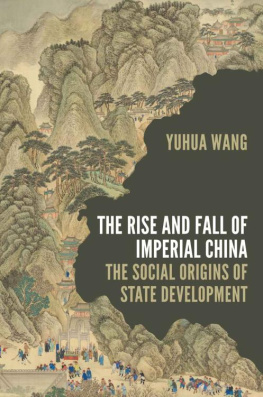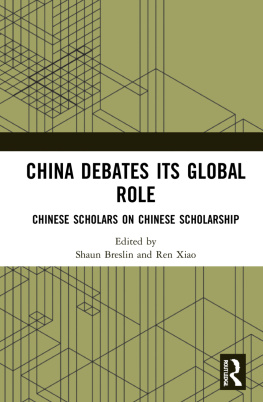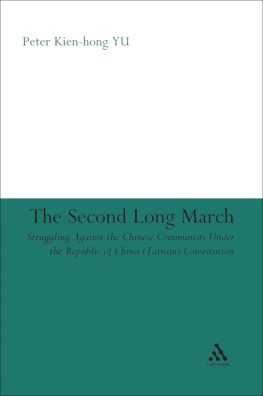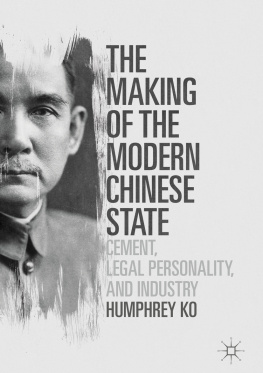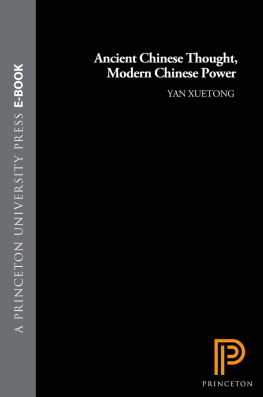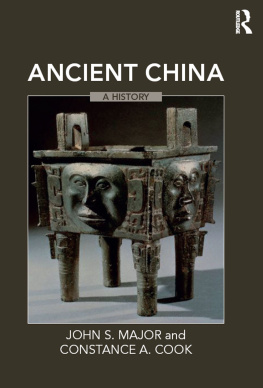
THE CONSTITUTION OF ANCIENT CHINA
Copyright 2018. Princeton University Press. All rights reserved. May not be reproduced in any form without permission from the publisher, except fair uses permitted under U.S. or applicable copyright law.
The Princeton-China Series
DANIEL A. BELL, SERIES EDITOR
The Princeton-China Series aims to publish the works of contemporary Chinese scholars in the humanities, social sciences, and related fields. The goal is to bring the work of these important thinkers to a wider audience, foster an understanding of China on its own terms, and create new opportunities for cultural cross-pollination.
The Constitution of Ancient China by Su Li, edited by Zhang Yongle and Daniel A. Bell, translated by Edmund Ryden
Traditional Chinese Architecture by Fu Xinian, edited by Nancy Steinhardt, translated by Alexandra Harrer
Confucian Perfectionism: A Political Philosophy for Modern Times by Joseph Chan
A Confucian Constitutional Order: How Chinas Ancient Past Can Shape Its Political Future by Jiang Qing, edited by Daniel A. Bell and Ruiping Fan, translated by Edmund Ryden
Ancient Chinese Thought, Modern Chinese Power by Yan Xuetong, edited by Daniel A. Bell and Sun Zhe, translated by Edmund Ryden
The Constitution of Ancient China

Su Li
Edited by Zhang Yongle & Daniel A. Bell
Translated by Edmund Ryden
PRINCETON UNIVERSITY PRESS
PRINCETON & OXFORD
Copyright 2018 by Princeton University Press
Published by Princeton University Press
41 William Street, Princeton, New Jersey 08540
6 Oxford Street, Woodstock, Oxfordshire OX20 1TR
press.princeton.edu
Jacket art courtesy of Shutterstock
All Rights Reserved
Library of Congress Cataloging-in-Publication Data
Names: Su, Li, 1955 author. | Zhang, Yongle, editor. | Bell, Daniel (Daniel A.), 1964 editor. | Ryden, Edmund, translator.
Title: The constitution of ancient China / Su Li ; edited by Zhang Yongle and Daniel Bell ; translated by Edmund Ryden.
Description: Princeton, New Jersey: Princeton University Press, 2018. | Series: The Princeton-China series | Includes bibliographical references and index.
Identifiers: LCCN 2017023088 | ISBN 9780691171593 (hardcover : alk. paper)
Subjects: LCSH: Constitutional historyChina. | Culture and lawChina. | ChinaPolitics and governmentHistory. | ChinaHistory.
Classification: LCC KNN2090 .S826 2018 | DDC 342.3102/9dc23
LC record available at https://lccn.loc.gov/2017023088
British Library Cataloging-in-Publication Data is available
This book has been composed in Miller.
Printed on acid-free paper.
Printed in the United States of America
10 9 8 7 6 5 4 3 2 1
CONTENTS
Zhang Yongle and Daniel A. Bell |
Su Li |
Su Li |
Su Li |
Su Li |
Wang Hui |
Liu Han |
Wu Fei |
Zhao Xiaoli |
Su Li |
EDITORS ACKNOWLEDGMENTS
THE EDITORS THANK Professor Zhu Suli and his four commentators for their contribution to this productive intellectual dialogue. Thanks are also due to Professor Jiang Shigong, who participated in the workshop on Su Lis manuscript in late 2013 and contributed insightful perspectives; to the Department of Philosophy at Tsinghua University, which hosted this workshop; to anonymous referees for Princeton University Press who wrote constructive and insightful reports on an earlier draft of this book; to Tsinghua University, which provided the project funds for the translation; to our logistics assistant, Dr. Cao Chengshuang; to Zhang Hantian, who proofread the footnotes and bibliography; and, last but not least, especially to our brilliant translator, Dr. Edmund Ryden, and to our thoughtful and efficient editor at Princeton University Press, Rob Tempio.
THE CONSTITUTION OF ANCIENT CHINA
Editors Introduction
Zhang Yongle & Daniel A. Bell
CHINAS ECONOMIC PROSPERITY has brought increasing interest in the future of its political system. In this context, the Chinese constitution has gradually become a focus of public attention. Among contemporary Chinese legal scholars, Zhu Sulis studies on the ancient Chinese constitution occupy a unique position. His approach, radically different from the mainstream, gives rise to many new findings with deep implications for understanding contemporary China. (As Zhu Suli often uses Su Li as his pen name, he will be referred to as Su Li hereafter.)
Before the twentieth century, imperial China never had a written Constitution defining major aspects of political life. In the early twentieth century, in an effort to be recognized as a modern state, China imported the Western civil law tradition, in which lawyers were trained to deal with written laws. Although the great constitutional monarchist Yan Fu at that time understood constitution as the fundamental structure of physical bodies and social organizations, and applied the concept to the interpretation of Chinas ancient political institutions,in contemporary China the attempt to do this is an intellectually pathbreaking adventure.
This is merely one of the many intellectual adventures Su Li has attempted. In China, his intellectual reputation reaches far beyond legal circles. It is widely recognized that he has made groundbreaking contributions to the sociology of law, law and economics, and law and literature in China. He reinterprets Mao Zedongs and Confuciuss insights about human nature and social institutions using the academic discourse of social sciences; he repeatedly reminds readers of Chinas internal complexity. Like Richard Posnerone of his favorite contemporary scholarshe often crosses the border and tests the nerves of other legal scholars by challenging established doctrines in constitutional, civil, criminal, administrative, and intellectual property law and other disciplines.
Su Li was born in Anhui Province on 1 April 1955 and served in the Peoples Liberation Army between 1970 and 1976. Like Justice Oliver Wendell Holmes, who once served in the U.S. Army, he stands ramrod straight, even now in his sixties. After more than five years service as a mapping and surveying soldier, he parlayed his military experience into employment. In 1978, the second year after resumption of the college entrance exam following the end of the Cultural Revolution, he was admitted to the Department of Law of Peking University. After his graduation in 1982, he served in the Guangdong customs office for two years, and then returned to Peking University as a graduate student in the history of Chinese legal thought. In 1985, he went to the United States and studied first at McGeorge School of Law at the University of the Pacific in California, and later at Arizona State University. He earned LL.M. (1987, U.S. business tax law), M.A. (1992, U.S. legal system), and Ph.D. (1992, interdisciplinary studies of law) degrees before returning to Peking University in 1992 to teach in the Department of Law. He served as dean of the School of Law from 2000 to 2010.
Su Li experienced nearly the entire process of the reconstruction of the legal academic tradition after the Cultural Revolution. After 1949, China systematically imported the Soviet legal tradition, but during the Cultural Revolution, even this tradition was partially suppressed, not to mention Western liberal or social democratic traditions. During Su Lis period of undergraduate studiesa crucial time for the reconstruction of Chinas legal academic traditionlaw students still studied Soviet legal theory, but they were increasingly attracted to Western legal thought. As China moved toward a market economy, Soviet legal discourse gradually lost favor. Legal thought from the United States, Europe, and Japan provided new sources for academic progress. It is almost a tacit consensus among legal scholars that China should follow Western developed countries in the reconstruction of its legal system.
Next page


